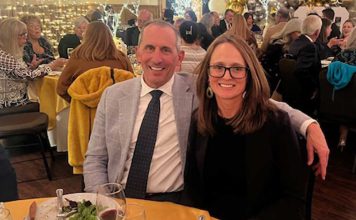Perhaps a reminder is in order why the First Amendment of the United States Constitution reads, in part, “Congress shall make no law … abridging the freedom of speech, or of the press.”
At a community meeting held April 21 to discuss a series of protests planned for this coming Cinco de Mayo by opposing groups of South County residents, Morgan Hill Unified School District Superintendent Steve Betando largely blamed the media for the original controversy in 2010.
“There certainly wouldn’t have been as much anxiety, angst and problems in 2010 if the media wasn’t involved,” Betando told the crowd of students, parents and city officials.
Forget for a moment that by reporting the May 5, 2010 flag flap and its aftermath the Dispatch, at worst, has merely exercised its freedoms of speech and of the press that are guaranteed by the First Amendment of the U.S. Constitution—freedoms that set this country apart from closed societies run by dictators who would prefer to keep their citizens in the dark.
In North Korea, Internet access is largely restricted to government officials who require special permissions to use the worldwide web. In Russia, the supposedly “free” press is routinely bullied, harassed and coerced into printing and broadcasting only news that flatters the government.
More important is the reason why a free press is so crucial to an open society. Four Live Oak High School students thought they were treated unfairly by the school’s staff who asked them to turn their patriotic themed T-shirts inside out May 5, 2010. Later that day they went to the news media, who found the potential abridgment of the students’ fundamental First Amendment rights a worthy inquiry with careful attention paid to the facts of the incident and the points of view of all parties involved (at least in Dispatch pages).
And with the same commitment to fairness and truth, the Dispatch has continued to cover the ensuing legal battle, which has reached all the way to the federal Ninth Circuit Court, in order to keep the four students accountable in the eyes of the world and to clarify that MHUSD has rights too.
American history abounds with examples of the need to uncover potential abuse and the press’ role in identifying serious problems before they snowball out
of control.
A recent local example of the role of the press, facilitated by the First Amendment, is the prosecution in 2013 of former Mexican American Community Services Agency leaders Olivia Soza Mendiola and Benjamin Tran. The duo pleaded guilty to embezzling money from employees’ retirement funds to finance day-to-day operations at MACSA’s El Portal Leadership Academy in Gilroy and other institutions run by the organization.
South Valley Newspapers uncovered this fraud in 2009, resulting in a criminal investigation that led to the officials’ convictions in Santa Clara County Superior Court last year.
Another unrelated example is that of former county Supervisor George Shirakawa, convicted in November 2013 of repeatedly misusing campaign and public tax dollars after San Jose’s Metro Silicon Valley unearthed his crimes.
Who knows how much longer Soza Mendiola, Tran and Shirakawa would have continued to rip off the public and others who were supposed to trust them if their misdeeds hadn’t been uncovered by the media?
We will never claim to be the judge or prosecutor, and we are certainly aware that not every conflict we report rises to the level of a criminal or civil rights abuse. But without a free press, how would anybody else know?











